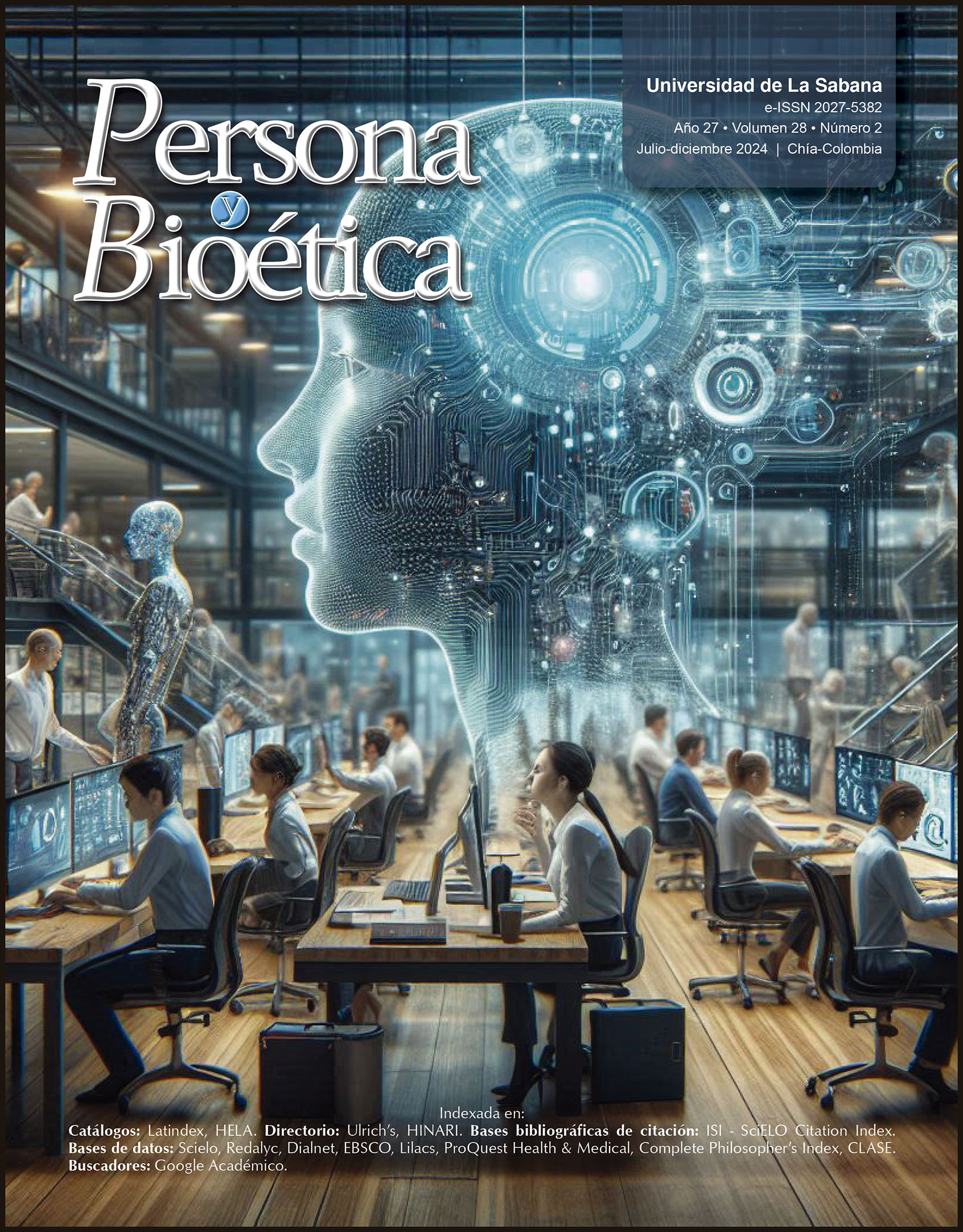Algor-ethics and a Bioethical Look at Artificial Intelligence
DOI:
https://doi.org/10.5294/pebi.2024.28.2.1Keywords:
Algor-ethics, algorithms, anthropology, dignity, digital age, artificial intelligenceAbstract
The emergence of Artificial Intelligence (AI) is causing hope and uncertainty due to its vast possibilities and the risks it represents. After succinctly explaining what AI consists of, examples of the presence of systems and applications in different and disparate fields are shown in the industry, biotechnology, climate change, medicine, business, entertainment, and finance. The effects that AI can have on the planet, on culture and on the lives of human beings make it necessary to reflect on the ethics of these applications, since their omnipresence can lead to an algor-cracy (the digital era governed by algorithms), making it necessary to think about and develop an algor-ethics to guide the use of AI and its applications. A decalogue of ethical guidelines is offered to ensure that what is technically possible is in favor of human beings and never harms them, nor fosters adverse or harmful conditions for them. In addition to ethical and bioethical regulation, AI applications need a legal framework. The Artificial Intelligence Act, passed by the European Parliament in March 2024 and drafted with a risk-based approach, is briefly discussed. It is concluded that ethical and bioethical parameters that humanize AI are essential, based on a true anthropology that guarantees its use in the service of humans, placing the primacy of human dignity at the center.
Downloads
References
MIT Technology Review. EmTech. Big ideas. Big decisions. Big impact [Internet]. [consultado 2024 Mayo 31]. Disponible en: https://event.technologyreview.com/emtech-mit-2023/detailed-agenda
Benanti P. Oracoli: Tra algoretica e algocrazia. Roma: Ed. Luca Sossella; 2018.
European Parliament. What is artificial intelligence and how is it used? [Internet]. [consultado 2024 Mayo 31]. Disponible en: https://www.europarl.europa.eu/news/it/headlines/society/20200827STO85804/che-cos-e-l-intelligenza-artificiale-e-come-viene-usata
Boreland B, Kunze H, Levere KM. Artificial Neural Networks. En: Kunze H, De La Torre D, Riccoboni A et al., editores. Engineering mathematics and artificial intelligence: foundations, methods, and applications. Boca Ratón, FL: CRC Press; 2024. pp. 227-244. DOI: https://doi.org/10.1201/9781003283980-10
Colagrande F, Tridente G. 50 domande & risposte sull’intelligenza artificiale. Roma: EDUSC; 2024.
Zhu Z, Shi D, Guankai P et al. Retinal age gap as a predictive biomarker for mortality risk. Br J Ophthalmol. 2023;107:547-54. DOI: https://doi.org/10.1136/bjophthalmol-2021-319807
Schmidt-Bortolini V, Colombo C. Artificial intelligence in medicine: the need to see beyond. Brazilian J of Law, Technology and Innovation. 2024 Ene 30;2(1):71-89. DOI: https://doi.org/10.59224/bjlti.v2i1.71-89
Gamboa-Bernal G. Objetivos de Desarrollo Sostenible (ODS) y pospandemia: mirada bioética a un nuevo marco de reflexión y aplicación. En: López-González SP, coordinador. Objetivos de Desarrollo Sostenible de la Agenda 2030. Una visión iberoamericana. Ciudad de México: Tirant lo Blanch; 2022. pp. 69-91.
Echeverry-Raad J. A falsehood that has been repeated many times becomes true, the origin of the diabesity pandemic, the most lethal of the 21st century? J Diab Metab Disorder. 2024;11(1):39-50. DOI: https://doi.org/10.15406/jdmdc.2024.11.00276
Benati P. Human in the loop. Decisioni umane e intelligenze artificiali. Milán: Mondadori; 2022.
Benati P. Pacem in cyberspace, auspicia algoretichs. En: Rugge F, editor. AI in the age of cyber-disorder. actors, trends, and prospects. Milán: ISPI-Brookings; 2020. pp. 134-153.
Benanti P. Algor-etica: l’incertezza ci salverà [Internet]. [consultado 2024 Jun 27]. Disponible en: https://www.paolobenanti.com/post/2019/02/13/algor-etica-ricerca-universale
Villalba JF. Algor-ética: la ética en la inteligencia artificial. An Fac Cienc Jurídicas Soc Univ Nacional de la Plata. 2020;17(50):679-698. DOI: https://doi.org/10.24215/25916386e062
Peroraro R, Curzel E. Convocatoria de Roma por la ética de la IA: el nacimiento de un movimiento. Medicina y Ética. 2023;34(2):315-349. DOI: https://doi.org/10.36105/mye.2023v34n2.01
Kumar R, Eaton SE, Mindzak M, et al. Academic integrity and artificial intelligence: an overview. En: Eaton SE, editor. Second Handbook of Academic Integrity. Cham: Springer; 2024. pp. 1583-96. DOI: https://doi.org/10.1007/978-3-031-54144-5_153
Morandín-Ahuerma F. Veintitrés principios de Asilomar para la inteligencia artificial y el futuro de la vida. En: Morandin F, editor. Principios normativos para una ética de la inteligencia artificial. Puebla: Concytep; 2023. pp. 5-27. DOI: https://doi.org/10.31219/osf.io/dgnq8
Arora A, Barrett M, Lee E et al. Risk and the future of AI: algorithmic bias, data colonialism, and marginalization. Inf Organization. 2023;33(3): 100478. DOI: https://doi.org/10.1016/j.infoandorg.2023.100478
Cachat-Rosset G, Klarsfeld A. Diversity, equity, and inclusion in artificial intelligence: an evaluation of guidelines. Appl Artificial Intelligence. 2023;37(1):2176618. DOI: https://doi.org/10.1080/08839514.2023.2176618
Banerji R. Artificial intelligence, humanness, and nonverbal sociality. Anthropology in Action. 2023;30(3):49-58. https://doi.org/10.3167/aia.2023.300306
Rudschies C. Exploring the concept of solidarity in the context of AI: an ethics in design approach. Digital Society. 2023;2(1):1. DOI: https://doi.org/10.1007/s44206-022-00027-x
Cortez F. Artificial intelligence, climate change and innovative democratic governance. European J Risk Regulation. 2023;14(3):484-503. DOI: https://doi.org/10.1017/err.2023.60
Pazos-Castro R. El principio de subsidiariedad en la normativa europea para un mercado único digital. Cuad Derecho Transnacional. 2023;15(2):801-32. DOI: https://doi.org/10.20318/cdt.2023.8079
European Parliament. Artificial intelligence: threats and opportunities [Internet]. [consultado 2024 Jun 30]. Disponible en: https://www.europarl.europa.eu/topics/en/article/20200918STO87404/artificial-intelligence-threats-and-opportunities
Parlamento Europeo. Ley de Inteligencia Artificial [Internet]. [consultado 2024 Jun 30]. Disponible en: https://www.europarl.europa.eu/doceo/document/TA-9-2024-0138_ES.pdf
European Parliament. Artificial Intelligence Act: MEPs adopt landmark law [Internet]. [consultado 2024 Jun 30]. Disponible en: https://www.europarl.europa.eu/news/en/press-room/20240308IPR19015/artificial-intelligence-act-meps-adopt-landmark-law
Lee P, Goldberg C, Khane I. The AI revolution in medicine: GPT-4 and beyond. Hoboken, NJ: Pearson; 2023.
Downloads
Published
How to Cite
Issue
Section
License
Copyright (c) 2024 Gilberto A. Gamboa-Bernal

This work is licensed under a Creative Commons Attribution 4.0 International License.
Authors who publish with this journal agree to the following terms:
This journal and its papers are published with the Creative Commons License Attribution-NonCommercial-NoDerivatives 4.0 International (CC BY-NC-ND 4.0). You are free to share copy and redistribute the material in any medium or format if you: give appropriate credit, provide a link to the license, and indicate if changes were made; don’t use our material for commercial purposes; don’t remix, transform, or build upon the material.









